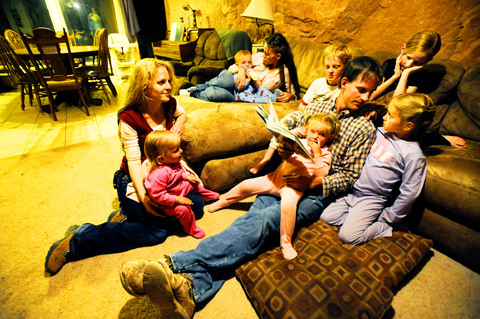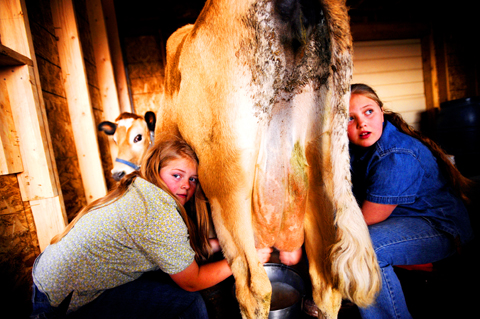There are times when travelers in this backside-of-nowhere expanse of desert pull over on the sandy twist of road and train their binoculars on Bob Foster’s rock.
What they see is like some sort of Flintstones mirage — a village built into a massive curve of jutting sandstone. And, as many folks have heard, there are some polygamists living here.
This is nothing like Big Love, the HBO series about the self-centered trials of a suburban polygamous family. It is also a far cry from Eldorado, Texas, where the recent raid of a polygamous sect’s secretive compound is making headlines around the world.

PHOTO: NY TIMES NEWS SERVICE
At Rockland Ranch, so identified by a decrepit sign at the entrance, there are no locked gates. No walls. No dormitory-style homes for gigantic plural families. No gleaming temple. No women swaddled in old-fashioned dresses. No prophet.
Everyone here expresses strong disapproval of child brides and forced marriages.
Instead, the lives of the 80 or so modern-day cliff dwellers who call Rockland home are relatively normal. They have to do with 4-H clubs, piano lessons, chiropractor visits and pizza recipes.

PHOTO: NY TIMES NEWS SERVICE
The residents’ collective oddity is that they live in 10 houses built into caverns dynamited into a rock, 48km from the closest town and 13km from the nearest neighbors.
Bob Foster, 82, found this rock while traveling through Utah’s backcountry 30 years ago. He leased it and the surrounding 32 hectares from the Utah school lands administration for 50 years at a cost of US$6,500 a year. And he has been blasting and carving it into his vision of a Christian community ever since.
“The Mesa Verde people would have done it just like this if they could have,” Foster says as he sweeps a hand across the 805m-long, 152m-high rock. It’s been his home for more than a quarter century and is also home to one of his three wives, six of his 38 children and a lively troop of some of his 82 grandchildren.

PHOTO: NY TIMES NEWS SERVICE
DIFFERENT STROKES FOR DIFFERENT FOLKS
But, Foster stresses, don’t call this a polygamous community. He and his son Enoch and several others are in plural marriages. Most residents are not, even though their surnames include Barlow, Morrison and Swapp — names that can be traced back to the early days of polygamy in the Mormon Church or to infamous polygamous sects that have sprung up since the church banned the practice 118 years ago. They represent different faiths — Mormons, Baptists, Fundamentalist Church of Jesus Christ of Latter Day Saints and hybrids.
“It’s simply a place where we strive to respect each other’s differences,” explained Enoch Foster, who has taken over many of the duties of running the community from his father.
That doesn’t mean Bob Foster is slowing down. He marches to the voice of God, who he says gives him orders regularly.
He bounds up and down the rock like someone half his age, pointing out where God wants him to build this and that and railing about the bad goings-on in Salt Lake City — “Sin City,” he calls it.
His hair has grown wispy white. His neck is scarred by recent cancer surgery, and his face is splotched with red patches from too many close encounters with dynamite since he came out here in 1979.
He had been divorced by his first wife by then, excommunicated by the Mormon Church, stripped of his seminary teaching job and convicted of bigamy. He was looking for a place to live out his beliefs and to offer shelter to other “seekers of the truth.”
He took multiple wives, he said, after God yanked him out of his cabin near Mount St Helens, Washington, transported him through fiery gates to the throne of heaven, and gave him a command that he should live “the Principle.”
He tells that saga with much flipping through a thick, well-used volume for passages that support his beliefs — and regularly bring him to tears. The book includes the Book of Mormon, two other Mormon tomes and the Bible. Foster has lined the pages with multicolored markers and made tiny notations in the margins.
When it comes to plural marriage, Foster admits he is considered a radical. He urged his wives to find careers when he turned 65 and thought he would not have much longer to live. Second wife Susan went to Durango, Colorado, to work in accounting. Fourth wife Carla went to medical school and is now a physician near Salt Lake City. Third wife Karen opted to stay at the rock, where she raises Yorkshire terriers, tends an organic garden and runs a trash-transfer station several days a week in La Sal.
“You don’t control peoples’ lives,” Foster emphasizes. “That is wicked. You set them free.”
AWAY FROM IT ALL
Susan and Carla spend time at Rockland. Each of them has a cavern blasted into the rock so that homes can be built for them if they should decide to live there full time again. Most of Foster’s children have lived off the rock for periods with their mothers. Some want nothing to do with Rockland. But some share in their father’s vision.
Enoch Foster, 29, came back a decade ago when he saw his father’s ideal community dying. Capitalizing on ideas he had developed as a child about better ways to inhabit a rock, Enoch began remodeling and building projects. Other siblings followed him back to the rock, bringing husbands and families.
Their numbers swelled two years ago when five families, disillusioned with life at Colorado City, Arizona, moved to the rock.
Those families have helped Bob Foster carry out his dream of having a sort of rock condo — the Charity House — that includes a dozen apartments and now has a chapel, baptismal pool, restaurant and conversation pit under construction.
It is currently home to some of the Colorado City transplants and to Jerry Fulton, a 36-year-old truck driver who said he had lost his way in the world and knocked at Foster’s door one day asking for help.
“One of the neatest things about Dad is his desire to take care of others,” Enoch said as he recounted stories of the many people Bob Foster has taken in over the years.
Enoch, whose quiet, measured speech is in marked contrast to his father’s rapid-fire talk, is putting finishing touches on a 520m², two-story home that includes two downstairs apartments for other families and a spacious, light-filled upstairs unit for himself and his wives, Catrina and Lillian, and their growing family.
They have eight children and both wives are expecting. Their current cramped home in the rock is a jumble of kids ranging in age from 7 months to 10 years. The wives rotate child-care duties each day. One homeschools the older kids while the other does household chores and tends the youngest.
MANY HANDS MAKE LIGHT WORK
On one recent day, Catrina had a gaggle of children pressed around her as she pointed out the Panama Canal on a globe and asked geography questions that were eagerly answered. Meanwhile, Lillian lined up rows of sliced bread for grilled sandwiches.
After the kids had eaten, the sister wives, who fondly call each other “Trina” and “Lil” and dress in the same trendy low-slung jeans, walked to their new home with a plate of lunch for Enoch. He was spending a long day working on the home’s deck.
In late afternoon, Catrina, Enoch’s wife of 11 years, took over bread making and dinner preparations while Lillian, who joined the family three years ago, led a troop of kids to the barn to milk the cows and feed the chickens.
“If people out in the world think I’m crazy, that’s OK,” Lillian said. “If they could only see the joy I have in serving my family. I am so happy in the life I lead. I’m with my loved ones — my children, my husband, my sister wife. I’m doing what Christ wants me to do.”
Polygamy, she said, if done right, allows its practitioners to take the focus off themselves and become less selfish.
But it is not for most people.
“We’re really, really strong on preaching to people not to have polygamy. We don’t think most people should do it,” she said. “You have to be called to it.”
“It’s a lot of work for a man,” said Enoch, who stresses the gravity of polygamy when it’s his turn to give the sermon to the rock inhabitants as they gather in a ring of folding chairs for Sunday afternoon services. “Plural marriage requires a great deal of giving.”
That is obvious when a sawdust-dappled Enoch comes home exhausted after his long work day and is swarmed by children eager for their nighttime ritual — his reading a story, followed by a shrieking and giggle-filled family wrestling match.
His day finally ends when he and the rest of the family kneel around the sectional couch, bow their heads, and say their prayers.
“Thank you, Jesus. Thank you for a good day,” one of the children prays.
Enoch’s sister Anna Knecht lives one door away with her husband and children. They are Mormon and don’t believe in plural marriages for themselves.
But Anna says her life growing up at the rock with three mothers was good.
“We were raised in what we thought was a wonderful life,” she said, holding her newest baby.
Another sister, Rachael Morrison, stays at the rock whenever she can take time off from her job as a mail carrier in Park City, Utah.
“I usually tell people we have a ranch down in Moab,” Rachael said. “Then when I know them better, I’ll tell them it’s a rock.”
Her husband’s parents built what is one of the most lavish homes in the rock, with castle turrets on the outside and all the latest in furniture and appliances inside.
Her sister Melinda Morrison lives down the rock in a more modest home that used to include a sister wife. That wife recently moved to Park City after the two clashed. “We had different ways of doing things,” Melinda explains matter-of-factly.
‘SICK AND PERVERTED’
The Tapestry Against Polygamy organization is not familiar with Rockland Ranch, but the co-founder of the nonprofit, which assists women who want to get out of polygamy, says what’s happening here is wrong.
“It’s sick and perverted any way you look at it,” said Rowenna Erickson, who lived in a polygamous marriage for 34 years. She said polygamy is all about men’s desires.
“They just bend the rules around what they want,” she said.
The focus on polygamy since agents raided the compound in Eldorado three weeks ago has incited some fear — and loathing — out here.
There was heated debate at a recent Rockland weekly meeting about a reporter visiting the ranch. The residents fear they will be portrayed as end-of-time weirdos.
Bob Foster said he prevailed when, “I reminded them we have nothing to hide.”
Some here, including Bob Foster, are convinced the end times are drawing nigh, though one wouldn’t know it by all the forward-focused activity.
Hammering and sawing echoes along the rock as new homes are added and older homes are remodeled with intricate tile work and walk-in closets. A Home Depot truck chugs in with loads of sheetrock and doors. A yellow bus drives down the road bearing half a dozen Rockland kids to public schools in Monticello.
Cell phones clipped on hips jangle electronic tunes as residents communicate about their plumbing, carpenter work, tile-setting and mail delivery jobs in the outside world. Toddlers crowd together on couches to watch Baby Einstein videos. Sister wives plan shopping trips to Wal-Mart.
Some Moab and Monticello residents relate that Bob Foster ran a bed-and-breakfast in the rock in the late 1990s and that curious Europeans were his most steady customers.
Mostly, locals say they like and respect Rockland residents, whom they realized long ago are hard-working, friendly folks.
Bob Foster even has fans in the Utah attorney general’s office. That office, with an estimated 37,000 polygamists in and around its jurisdiction, has opted not to prosecute polygamy between consenting adults. Instead, the office goes after child abusers and molesters.

Not long into Mistress Dispeller, a quietly jaw-dropping new documentary from director Elizabeth Lo, the film’s eponymous character lays out her thesis for ridding marriages of troublesome extra lovers. “When someone becomes a mistress,” she says, “it’s because they feel they don’t deserve complete love. She’s the one who needs our help the most.” Wang Zhenxi, a mistress dispeller based in north-central China’s Henan province, is one of a growing number of self-styled professionals who earn a living by intervening in people’s marriages — to “dispel” them of intruders. “I was looking for a love story set in China,” says Lo,

It was on his honeymoon in Kuala Lumpur, looking out of his hotel window at the silvery points of the world’s tallest twin skyscrapers, that Frank decided it was time to become taller. He had recently confessed to his new wife how much his height had bothered him since he was a teenager. As a man dedicated to self-improvement, Frank wanted to take action. He picked up the phone, called a clinic in Turkey that specializes in leg lengthening surgery — and made a booking. “I had a lot of second thoughts — at the end of the day, someone’s going

In the next few months tough decisions will need to be made by the Taiwan People’s Party (TPP) and their pan-blue allies in the Chinese Nationalist Party (KMT). It will reveal just how real their alliance is with actual power at stake. Party founder Ko Wen-je (柯文哲) faced these tough questions, which we explored in part one of this series, “Ko Wen-je, the KMT’s prickly ally,” (Aug. 16, page 12). Ko was open to cooperation, but on his terms. He openly fretted about being “swallowed up” by the KMT, and was keenly aware of the experience of the People’s First Party

Standing on top of a small mountain, Kim Seung-ho gazes out over an expanse of paddy fields glowing in their autumn gold, the ripening grains swaying gently in the wind. In the distance, North Korea stretches beyond the horizon. “It’s so peaceful,” says the director of the DMZ Ecology Research Institute. “Over there, it used to be an artillery range, but since they stopped firing, the nature has become so beautiful.” The land before him is the demilitarized zone, or DMZ, a strip of land that runs across the Korean peninsula, dividing North and South Korea roughly along the 38th parallel north. This